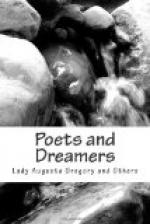It was only a few years ago, when Douglas Hyde published his literal translations of Connacht Love Songs, that I realized that, while I had thought poetry was all but dead in Ireland, the people about me had been keeping up the lyrical tradition that existed in Ireland before Chaucer lived. While I had been looking in the columns of Nationalist newspapers for some word of poetic promise, they had been singing songs of love and sorrow in the language that has been pushed nearer and nearer to the western seaboard—the edge of the world. ’Eyes have we, but we see not; ears have we, but we do not understand.’ It does not comfort me to think how many besides myself, having spent a lifetime in Ireland, must make this confession.
The ballads to be gathered now are a very few out of the great mass of traditional poetry that was swept away during the last century in the merciless sweeping away of the Irish tongue, and of all that was bound up with it, by England’s will, by Ireland’s need, by official pedantry.
To give an idea of the ballads of to-day, I will not quote from the translations of Douglas Hyde or of Dr. Sigerson already published. I will rather give a few of the more homely ballads, sung and composed by the people, and, as far as I know, not hitherto translated.
Those I have heard since I have begun to look for them in the cottages, are, for the most part, sad; but not long ago I heard a girl sing a merry one, in a mocking tone, about a boy on the mountain, who neglected the girls of his village to run after a strange girl from Galway; and the girls of the village were vexed, and they made a song about him; and he went to Galway after her, and there she laughed at him, and said he had never gone to school or to the priest, and she would have nothing to do with him. So then he went back to the village, and asked the smith’s daughter to marry him; but she said she would not, and that he might go back to the strange girl from Galway. Another song I have heard was a lament over a boy and girl who had run away to America, and on the way the ship went down. And when they were going down, they began to be sorry they were not married; and to say that if the priest had been at home when they went away, they would have been married; but they hoped that when they were drowned, it would be the same with them as if they were married. And I heard another lament that had been made for three boys that had lately been drowned in Galway Bay. It is the mother who is making it; and she tells how she lost her husband, the father of her three boys. And then she married again, and they went to sea and were drowned; and she wouldn’t mind about the others so much, but it is the eldest boy, Peter, she is grieving for. And I have heard one song that had a great many verses, and was about ’a poet that is dying, and he confessing his sins.’
The first ballad I give deals with sorrow and defeat and death; for sorrow is never far from song in Ireland; and the names best praised and kept in memory are of those—




